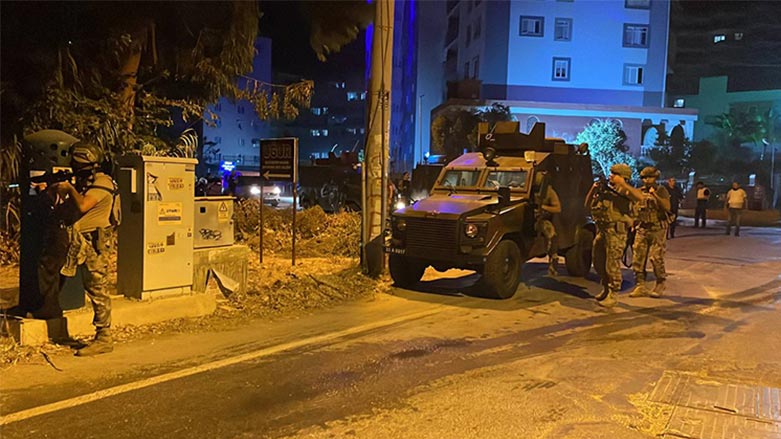A police officer was killed and another officer and a civilian were injured on Monday after two bombs exploded near police quarters in the southern Turkish province of Mersin following a shootout between two assailants and the police, local media reported.
According to a press statement issued by Turkish Interior Minister Süleyman Soylu, who went to Mersin following the attack, two female terrorists opened fire on the building, used as a residence by the police and guarded by them in Mezitli, starting a shootout between themselves and the police. The assailants, who were injured in the shootout, detonated their explosives, wounding two police officers and a civilian.
The severely wounded officer ultimately died, while the other officer’s injuries were not life threatening, Soylu said, adding that the private citizen who was hit was in surgery and was also in good condition.
The interior minister also released several written statements regarding Monday’s attack, informing that it took place around 11 p.m. local time, that the security forces also detonated a bomb set up near the residence and that an “armed suspect” was detained by security forces following the attack. The ministry also claimed that the outlawed Kurdistan Workers’ Party (PKK) was behind the attack, with one of the assailants determined to be Dilşah Ercan, code-named Zozan Tolan, from the PKK.
Designated as a terrorist group by Turkey and much of the international community, the PKK has been waging an insurgency against the Turkish state since 1984 that has claimed tens of thousands of lives.
Meanwhile, jailed Kurdish politician Selahattin Demirtaş, former co-chairperson of the pro-Kurdish Peoples’ Democratic Party (HDP), condemned the attack in Mersin in a tweet on Tuesday. Demirtaş’s Twitter account is managed by his family and lawyers.
He said the job of politicians is to insist on non-violent solutions to the country’s problems and that every kind of violence should be denounced.
“We will insist on democratic politics,” he said.
Mersin'deki silahlı saldırıyı kınıyorum.
Siyasetin sorumluluğu, şiddet dışı çözümlerde ısrarcı olmaktır. Ölümleri durdurmaktır.
Şiddetin her türlüsüne karşı çıkacağız, demokratik siyasette ısrarcı olacağız. Bunun herkes tarafından net olarak bilinmesini isterim.
— Selahattin Demirtaş (@hdpdemirtas) September 27, 2022
Many social media users said the attack in Mersin, which took place as Turkey readies for 2023 elections, reminded them of a series of terrorist attacks that took place between June and November 2015 and facilitated the return of the ruling Justice and Development Party (AKP) to power by frightening the public after the party had lost in a general election in June of that year.
In June 2015 the AKP lost its majority in a general election for the first time since 2002, while the pro-Kurdish Peoples’ Democratic Party (HDP) garnered over 10 percent of the vote and entered the Turkish parliament for the first time in its history.
Soon after the election President Recep Tayyip Erdoğan halted peace talks with the PKK and launched a massive counterterrorism operation in Turkey’s southeastern region, eventually causing dozens of civilian deaths and the destruction of some residential parts of the predominantly Kurdish provinces.
Meanwhile, the AKP and main opposition party had talks to form a government, but President Erdoğan had repeatedly expressed his desire to hold another election.
Later the Turkish parliament decided to hold new elections on Nov. 1, 2015.
Between June and November of that year, Turkey witnessed a number of terrorist attacks by the Islamic State in Iraq and the Levant (ISIL) that left 136 people dead. Clashes with the PKK in the same period also caused the death of nearly 170 security force members.
According to observers, that summer diverted public concern from the economy and authoritarian rule to national security, ultimately increasing public support for the ruling AKP in November.
The Turkish opposition believes the ruling party deliberately overlooked the terrorist threats in that period for political gain as well as initiating a fight against the PKK by abruptly stopping peace talks.
In the last general election held in June 2018, the AKP garnered a nationwide vote of 42.6 percent. However, public surveys have increasingly been showing the party’s public support to be slipping.

